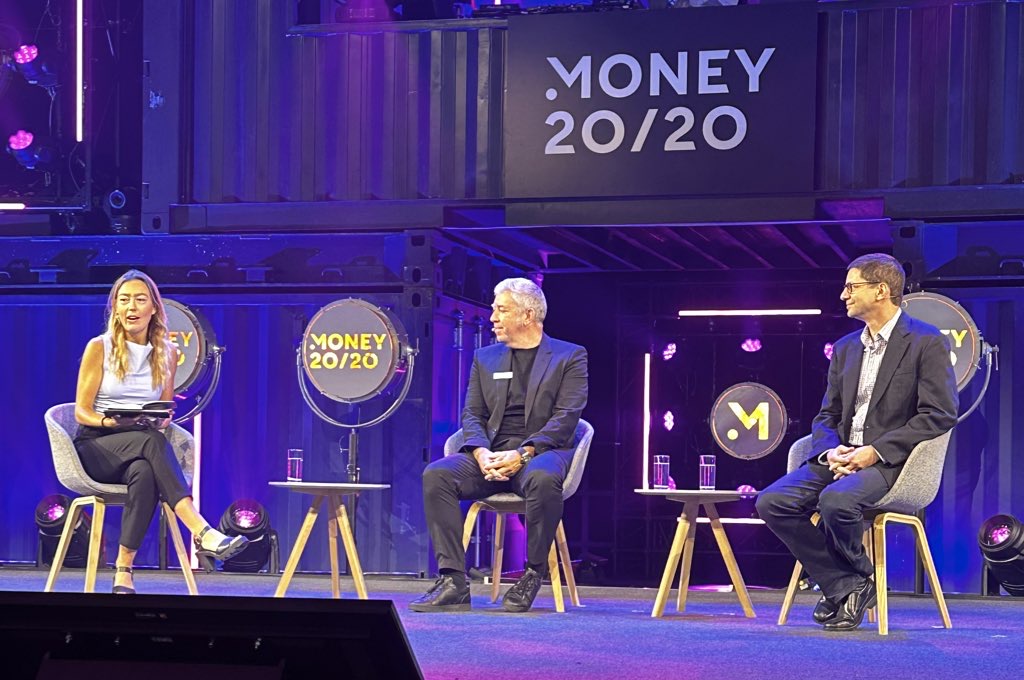Money 20/20 Europe – Implementing AI and Pay by Bank
The theme of this year’s Money 20/20 Europe in Amsterdam was Human X Machine.
This theme recognised the wave of AI that has permeated the tech world since ChatGPTs and LLMs (Large Language Models), in general, entered the public consciousness around 18 months ago. It hinted at a future where human and machine intelligence intersect in ways we cannot yet imagine, heralding an age of transformation where efficiency will increase in ways we can’t comprehend, leaving no portion of our ecosystem untouched by the collaboration between humans and machines.
Considering this theme, I spent some time at Money 20/20 listening to keynote talks on AI seeking to understand how this emerging technology can benefit the financial services sector.
First up was Europe’s challenger to Open AI, Mistral AI. The company was only established in mid-2023, yet as of this week, it has raised a total of $1bn and now has a $6bn valuation. Arthur Mensch, CEO of Mistral AI, was joined on-stage by Jonathan Userovici, General Partner, Headline (VC), and Ingrid Lunden, International Editor, for TechCrunch.
Despite Mistral AI being a French company, most of their business currently comes from American clients, who tend to be more mature in their implementation of AI technology. Yet being based in Paris comes with some advantages, it gives the company access to a wide European talent pool, drawing experts from both academia and big tech.
For clients in the financial services sector, Mistral AI can be deployed in a virtual cloud or on-site within a customer’s own infrastructure. This can be very popular with banks, who may not feel comfortable with a fully cloud-based approach with their vendors.

Arthur Mensch, Jonathan Userovici, and Ingrid Lunden
Arthur Mensch noted that customers with a SAAS business model, which includes many fintechs, are particularly interested in deploying LLMs. Mistral AI offers a start-up enablement programme alongside their VC partners. As part of this programme, early-stage companies may receive credits to use Mistral AI’s models and platforms, like how cloud service organisations such as AWS also support startups with operating credit, especially in their early days.
The next session, moderated by freelance reporter Amy O’Brien, featured Kevin Levitt, Director of Financial Services at Nvidia, and Patrice Amman, EMEA Financial Services Business Lead at Microsoft.
Kevin Levitt mentioned that Nvidia is communicating with the broad technology industry, an ongoing paradigm shift. Computing has been about retrieving data, but now, with LLMs and related technology, we are moving from a world of retrieval to generation. Nvidia CEO Jensen Huang has said AI is leading a new industrial revolution. Some Nvidia customers operate with hundreds of AI use cases, including extracting relevant information from documentation to better understand risk and deliver hyper-personalisation. One example cited from the payments world was Klarna, which has more than 90% of employees using AI on a day-to-day basis. It is expected that across trading, banking, and payments, there will be thousands of live use cases soon.
Microsoft’s Patrice Amman noted some of the major risks businesses face when it comes to AI – for instance, data privacy risk, leakage risk, and bias risk within AI models. Considering these risks Microsoft has developed a responsible AI framework and incorporates this into all its AI work across all its platforms, such as Azure and Microsoft 365. It is important to make security important, add controls, and then keep it consistent across all areas.
The message was clear: organisations must invest in AI to stay competitive. If they don’t, their competitors certainly will. Competitors will be able to provide better recommendations and an enhanced customer experience, so you need to stay with the trend and find how AI can add value to your customers.

Amy O’Brien, Kevin Levitt, and Patrice Amman
Technology has always been key to improving operational efficiency in financial services, and AI is no different. The key is understanding the challenges that technology can really solve within payments and fintech organisations, not just deploying LLMs to tick a box.
In addition to understanding the latest from experts in AI, it was interesting to listen to Javier Perez talk about investing in the future of payments. Javier Perez is a co-founder and Managing Partner of Global Paytech Ventures and the former CEO of Mastercard Europe. Javier highlighted that key factors to look for when evaluating a payments opportunity, are seamless integration, instant transactions, security and affordability. He also advised Fintech founders to look beyond just money when raising funds. Domain area expertise can also be vitally important. An investor who doesn’t understand the business area may become impatient when obtaining licenses to operate in certain markets takes longer than expected. However, someone with deep knowledge of a specific domain may be more tolerant when timelines extend beyond expectations and can aid in resolving any issues that may surface.

Javier Perez
Lastly, Open Banking as a payment method, or should we say Pay by Bank, was a hot topic at Money 20/20. Various panels discussed the challenges and trends in this area. One session that caught my eye was a discussion titled “Can I Pay for My Coffee with It? Making Pay by Bank Work?”, which looked at the challenge of using Pay by Bank on a day-to-day basis. This panel was moderated by Simon Taylor, Head of Strategy & Content at Sardine, and featured Brian Dammeir, Head of Europe, at Plaid, Emma Steeley, CEO of Aro, and Ian Morrin, Head of Payments & Platforms at Tink.
The panel agreed that while Pay by Bank offers significant cost savings for merchants, consumers in Western markets are still largely unfamiliar with it. In order to drive adoption, there is a need to establish industry standards and enhance consumer safeguards against fraud. Also, merchants may need to contemplate providing incentives to alter consumer behaviour to utilise Pay by Bank instead of cards.
Another engaging session on Pay by Bank was titled “Open Banking Success Stories: Turning Data into Business Value”. Moderated by Sarah Kocianski, CEO of Fintech Wales. It featured Karen Wall, EMEA Head of Open Banking Product at J.P. Morgan Payments, Carmela Gomez Castelao, Head of Open Banking at BBVA, and Tom Greenwood, CEO of Volt.

Sarah Kocianski, Karen Wall, Carmela Gomez Castelao, and Tom Greenwood
The panel discussed use cases of Open Banking in a B2B (business-to-business) environment. It was pointed out that there are actually a variety of different payment schemes that can be utilised for bank payments. For instance, Pay by Bank utilises the Faster Payments rails in the UK, but there are also other bank-based payment options such as CHAPS and BACS. Selecting which option to use will depend on the transaction size, as well as other key factors. Complexity such as this has meant that so far, the success stories are limited, but the possibilities are clear.
Overall, Money 20/20 Europe was a valuable event and a must-attend for anyone interested in payments and the wider fintech ecosystem. As well as many engaging keynote speakers and panels, there were plenty of opportunities to network and talk with start-ups and industry veterans alike – either at the RAI Convention Centre itself or at the various evening events.
Author: Matt Jones, Commercial Director, London, Payments Consulting Network
With over 15 years in the payments industry, Matt has worked with notable organisations like Barclays and Elavon, as well as startups in the fintech space. His expertise spans diverse commercial sectors, including direct engagements with major merchants and banks. Matt excels in procurement-level insights, adeptly handling pricing models, strategic planning, and competitive analysis. He regularly writes on payments related topics at Payments Culture.
***
Payments Consulting Network was one of the media partners of the recent Money20/20 Europe 2024. Don’t miss out on the next event! Sign up for event updates of Money20/20 Europe 2025 here.
***
If you enjoyed reading this article and would like to be notified when future articles are posted, please sign up for our email newsletter.
Are you interested in reading articles on a particular payments topic, company, payments industry executive or author? Click the search icon, it’s that magnifying glass on the top right-hand side of the website and type in the keywords that interest you. You will then be presented with a list of any articles that match your search criteria.




